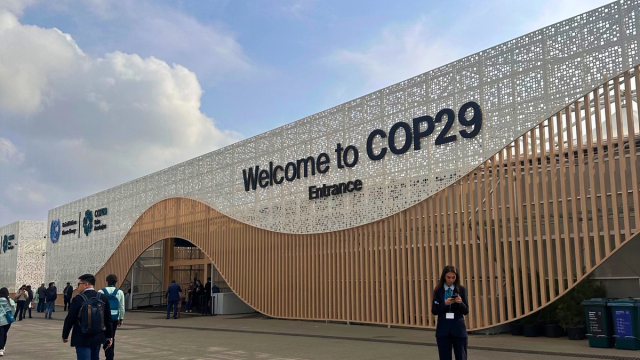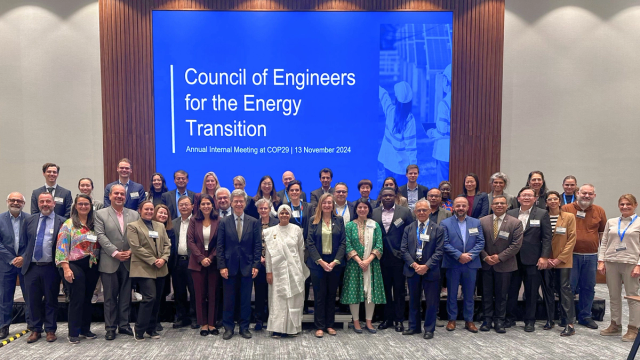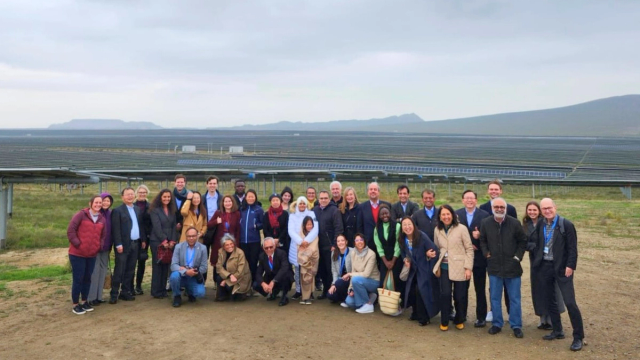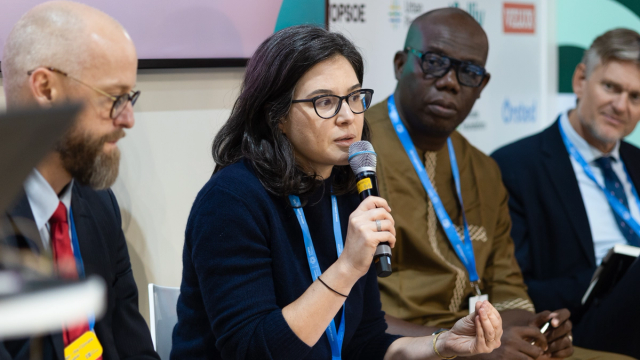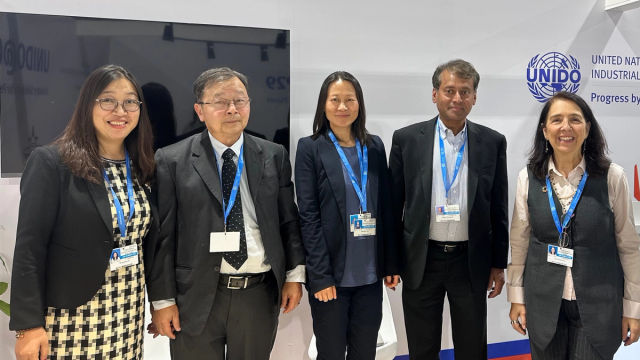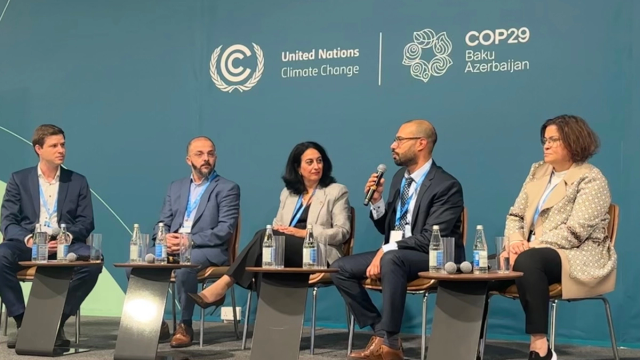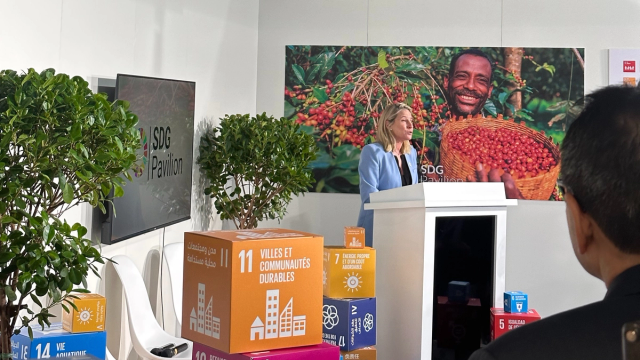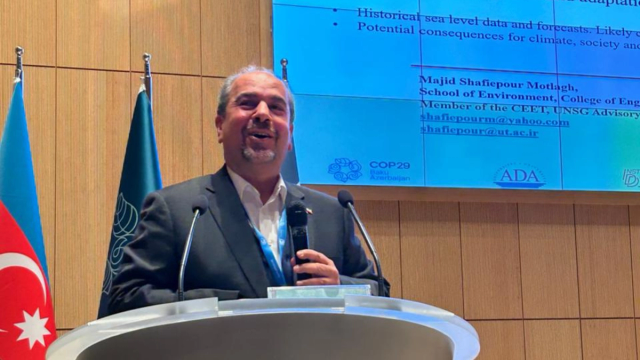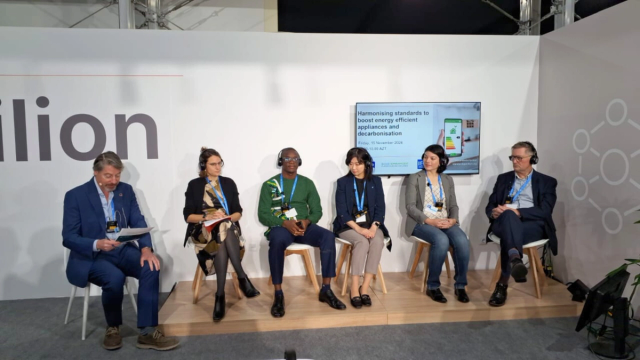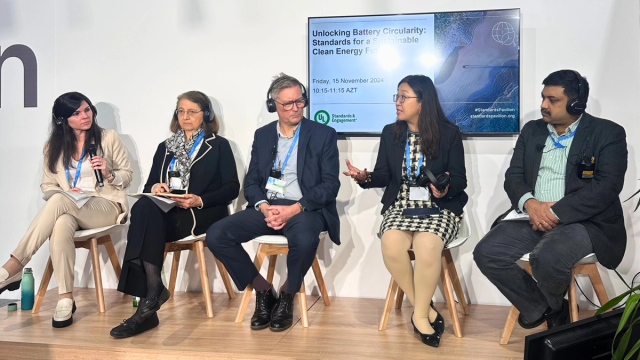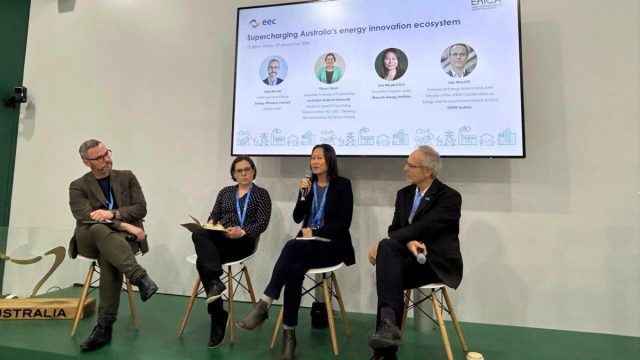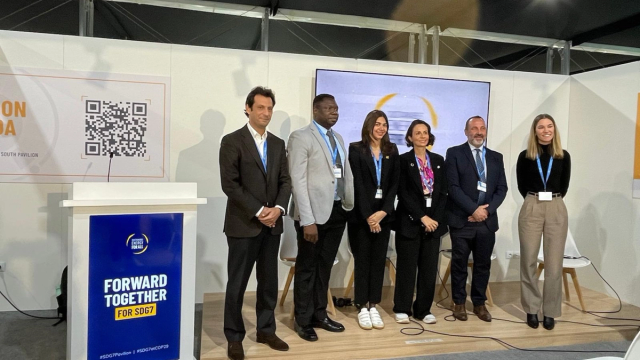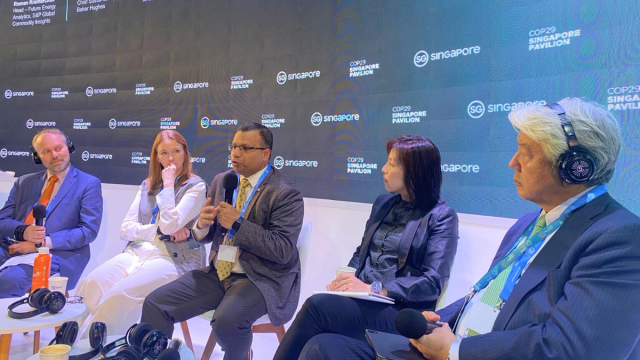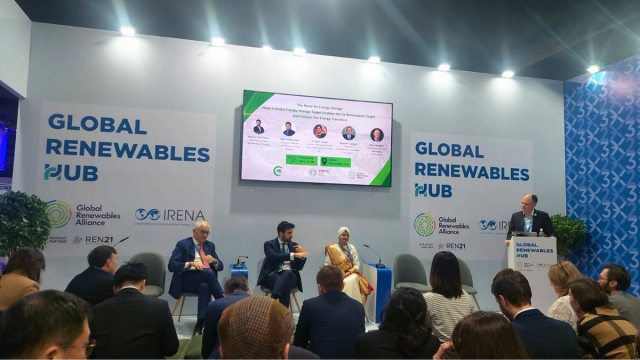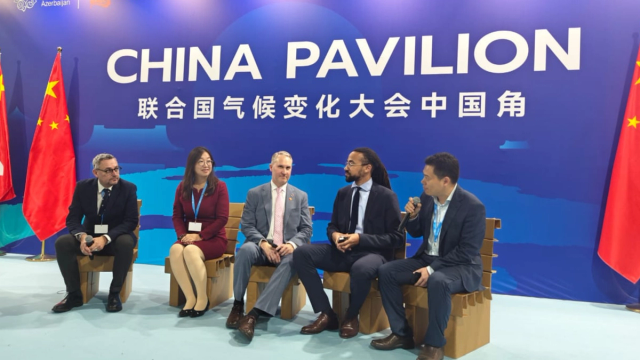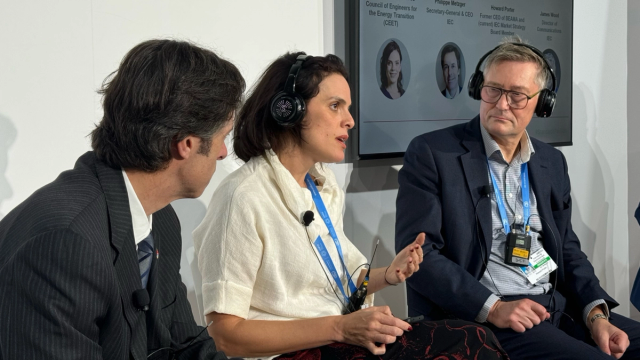Key highlights from the Council of Engineers for the Energy Transition (CEET) at COP29
The Council of Engineers for the Energy Transition (CEET) made significant strides at COP29, fostering technical pathways toward a sustainable, net-zero future.
Established under the UN Secretary-General, the CEET is a high-level global body of engineers dedicated to advancing the global energy transition. During the first week of the 29th UN Climate Conference (COP29), the Council convened to reflect on its 2024 achievements, unveil new Issue Briefs on decarbonization and energy efficiency, and set its 2025 priorities. CEET also led discussions on critical areas, including transforming waste into low-carbon shipping fuel, enhancing energy storage and grid capacity, and advancing carbon capture technologies.
Key Meetings and Milestones at COP29
The CEET Annual Meeting
The CEET, co-chaired by UNIDO and the UN Sustainable Development Solutions Network (SDSN), held its third in-person annual meeting alongside the COP29. Opening remarks from Mr. Ciyong Zou, Deputy to the Director General at UNIDO, and Prof. Jeffrey Sachs, SDSN President and CEET Chair, highlighted the vital role of innovative engineering in accelerating the global energy transition.
Discussions during the meeting centered on the CEET’s 2024 achievements and its 2025 strategy within the global energy and climate agenda.
Launch of New Issue Briefs
The CEET launched six new issue briefs, developed in collaboration with several UN entities:
- Energy Rating Labels and Potential for Energy Savings Across the Global South (UNEP)
- Managed Phaseout of Fossil Fuels Power Generation Facilities by Repurposing and Retrofitting for a Low-Carbon Future (UNFCCC, UNIDO)
- Navigating the Coal Transition in Asia: Challenges, Lessons, Pathways (UNFCCC)
- Comprehensive Catalog on Transportation Decarbonization (SDSN)
- Overview of Strategies for Reducing CO2 Emissions in China's Cement Industry (UNIDO)
- Unlocking Low-Emission Energy from Waste: A Sustainable Solution for Shipping and Fisheries in Emerging Economies (UNCTAD)
Tour of the Garadagh Solar Plant
Ahead of COP29, CEET members toured the Garadagh Solar Plant, the largest solar PV facility in the Caspian region.
A collaboration between the Azerbaijani Ministry of Energy, Azerenergy OJSC, and UAE-based Masdar, this landmark project generates 500 million kilowatt-hours of electricity annually, conserving 110 million cubic meters of natural gas. The Garadagh Solar Plant underscores the region’s commitment to a sustainable energy future.
CEET Events at COP29
From Megacity Waste to Low-Carbon Shipping Fuel: Converging Interests in Sustainability
This panel session explored how megacities can transform waste management challenges into opportunities for decarbonizing the shipping industry. With cities like Lagos generating vast amounts of perishable waste daily, panelists highlighted its potential as a feedstock for bio-methane, a low-carbon fuel for LNG-powered ships.
CEET members Alessandro Sanches Pereira, Semida Silveira, and Roberta Cenni discussed the dual benefits of this approach: addressing public health and environmental risks associated with untreated waste while helping the shipping sector meet International Maritime Organization (IMO) low-carbon fuel regulations. Guest speakers, including Michael Bankole, Laís de Souza Garcia, Ole Thonke, and Peter Hallbom, provided insights into the technical, policy, and economic frameworks necessary to implement this waste-to-energy model successfully.
Using Lagos as a case study, the session showcased the challenges of scaling reliable bio-methane production and integrating it into shipping supply chains. Interactive audience engagement underscored the importance of cross-sector collaboration between cities, the shipping industry, and investors. The event concluded with a call for interregional partnerships to replicate this model globally, positioning megacity waste as a cornerstone of sustainable urban and maritime development.
Expanding Energy Storage and Grids: Addressing Challenges and Exploring Solutions
Hosted at the UNIDO pavilion, this session brought together leading experts, including Babu Chalamala, Emi Minghui Gui, Shuguang Qi, and Wei-Jen Lee, to discuss strategies for achieving the COP29 Global Energy Storage and Grids Pledge.
Insights from China, the United States, and Southeast Asia addressed challenges such as reducing energy storage costs and alleviating supply chain bottlenecks for critical materials like lithium and copper. Panelists emphasized the need for business models that make storage projects bankable, highlighting services like grid stability, peak shaving, and renewable energy integration.
Examples of successful policies included capacity markets in the United States and financial incentives in China, showcasing how clear regulatory frameworks can accelerate energy storage deployment. For grid infrastructure, the session stressed proactive planning to accommodate renewable energy, reduce losses, and avoid curtailment. Innovations like smart grids and digital tools were identified as critical for improving reliability and enabling demand response.
A holistic approach was recommended, integrating storage, grids, and renewable energy systems to maximize synergies, enhance resilience, and support cost-effective deployment.
Viability of Integrating Carbon Capture, Utilization, and Storage (CCUS) Technologies
This session delved into the role of Carbon Capture, Utilization, and Storage (CCUS) technologies in the energy transition, presenting preliminary findings from an upcoming CEET publication developed with UNFCCC and UNESCWA.
With over 50 commercial CCS projects in operation and hundreds in development globally, panelists examined technical and logistical barriers, such as the limited availability of suitable storage sites, capture efficiency challenges, and uncertainties in actor responsibilities. Economic and financial considerations were also discussed, including high capital costs, dependence on public support, and the limitations of existing carbon pricing mechanisms.
The panel, featuring Mercedes Maroto-Valer, Mohammad Abu Zahra, Nitin Arora, Radia Sedaoui, and Tobias Orthen, explored how industrial clusters can achieve economies of scale through collaborative CCUS projects. Case studies from the United Kingdom demonstrated the potential for replicability in emerging economies. Discussions also addressed CCUS’s role in supporting Nationally Determined Contributions (NDCs) under the Paris Agreement and integrating with Article 6 mechanisms to decarbonize industries like steel and cement.
Workshop: Forming a Transport Sector Coalition
During a COP29 workshop, CEET member Ulf Larsson convened representatives from aviation, maritime shipping, road transport, and rail sectors to discuss forming a sustainable transport alliance. Participants included representatives from key organizations like IATA, IMO, UIC, and UITP, sharing their goals, challenges, and visions for collaboration.
The workshop explored aligning objectives, actions, and intended outcomes, as well as the challenges of tracking progress in the rapidly evolving transport sector. Meaningful discussions on fostering global partnerships set the stage for future collaboration, laying a strong foundation for advancing sustainable transport solutions worldwide.
Additional COP29 Speaking Engagements
The CEET participated in several additional speaking engagements during the COP29. To learn more about a specific session or connect with a speaker(s), contact ceet@unsdsn.org.
November 11, 2024
- Opening of the SDG Pavilion | Speaker: Sama Bilbao y Leon
November 12, 2024
- Environmental Bridges to Peace and Prosperity Conference hosted at ADA University | Speakers included: Selen İnal, Nicolaos Theodossiou, Majid Shafiepour Motlagh, and Mohammad Abu Zahra
November 15, 2024
- Harmonising Standards to Boost Energy Efficient Appliances and Decarbonization hosted at the Standards Pavilion | Speaker: Nida Rizwan Farid
- Unlocking Battery Circularity: Standards for a Sustainable Clean Energy Future hosted at the Standards Pavilion | Speaker: Shuguang Qi
- Supercharging Australia's Energy Innovation Ecosystem hosted at the Australia Pavilion | Speaker: Emi Minghui Gui
- Innovative Technologies for Industry - Revolutionising Transport: Unleashing Hydrogen's Potential at the Hydrogen Transition Summit hosted by the Climate Action Zone | Speaker: Ju Wang
- The Role of Green Hydrogen in Advancing 24/7 Carbon Free Energy hosted at the SDG7 Pavilion | Speakers: Peter Oviroh, Ali Zerouali and Henri Paillere
- Accelerating Decarbonization is Asia Pacific's Hard to Abate Sectors hosted at the Singapore Pavilion | Speaker Naveen Ahlawat Kumar
- Industrial Policies & Decarbonization Opportunities | Speaker: Luisa Valentim and Rosana Santos
- The Need for Energy Storage: How a Global Energy Storage Target Enables the 3x Renewables Target hosted at the Global Renewables Hub Pavilion | Speaker: Rashi Gupta
- Nuclear Energy, a Sustainable Source of Low Carbon Energy for the Arctic hosted at the Arctic Pavilion | Speaker: Henri Paillere
- Climate-Challenge-Changes-Communities: University Cooperation Research, Teaching, in the Black Sea Region hosted at the Bulgaria Pavilion | Speaker: Semida Silveira
- New Solution for Climate Crisis: Carbon-Free Energy Initiative hosted at the Korea Pavilion | Speaker: Henri Paillere
November 16, 2024
- Digital Transformation and Global Climate Governance hosted at the China Pavilion | Speaker: Shuguang Qi
- Digitally Connecting an All Electric World for Smarter Opportunities hosted at the Standards Pavilion | Speaker: Luisa Valentim
